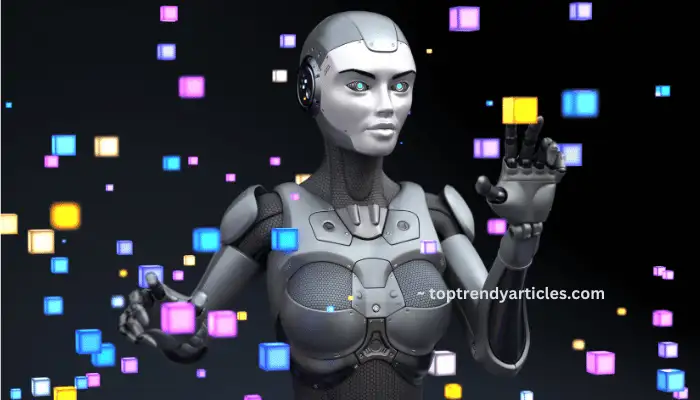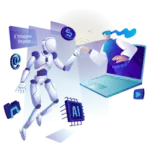Artificial Intelligence is a technology which allows digital computers and robots to carry out tasks normally performed by humans. They can be based on reasoning, extracting meaning from data, or learning from previous experiences. Artificial intelligence systems mimic the cognitive process of humans, which allows machines to complete complex tasks at high levels of proficiency. Digital computers were programmed in the 1940s to perform complex tasks such as solving mathematical problems or playing chess with remarkable skills.
Even with advances in memory and processing power, AI is still unable to match the flexibility of humans in a variety of areas that require extensive knowledge. AI is able to perform at expert levels in certain tasks. This makes it an invaluable tool for many domains, including medical diagnosis, search engine, voice recognition and chatbots.

AI in everyday life
AI is rapidly advancing and has permeated many aspects of our daily lives. It’s transforming the way we use technology and changing industries. These are the most common ways AI can be used to enhance our daily lives:
1. Apps for Taxi Booking
Uber and other ride-hailing applications use AI technology to make sure that you can get a car in minutes. AI analyses historical data in order to allocate drivers efficiently, predict demand patterns, and optimize driver distribution. AI-driven routes optimization also helps users find the quickest routes to reduce travel times and enhance user satisfaction.
2. Voice assistants
AI powers digital assistants such as Siri, Google Assistant and Alexa to interpret and process voice commands. The Voice User Interfaces can not only interpret spoken commands, but they also have access to vast cloud-based databases that are used for tasks and personalized search results. AI is becoming more important in voice assistants, especially in the healthcare sector, as they can detect disease through vocal biomarkers, and also support telehealth apps.
3. Chatbots
OpenAI’s ChatGPT is a sophisticated conversational agent that has evolved from simple rules-based systems. AI-driven systems, such as ChatGPT, use machine learning and natural language processing to provide customized responses and understand users’ queries. They also learn from user interactions and improve their performance. Customer service platforms are increasingly integrating chatbots to provide round-the clock assistance. They also enhance user satisfaction.
4. Streaming Entertainment Apps
AI is used by streaming platforms such as Netflix, Spotify and Hulu to improve user experience through personalized recommendations. AI algorithms use user interaction to recommend movies, TV shows, and music that are tailored to individual tastes. AI ensures that streaming is uninterrupted by optimizing the server allocation, and changing bandwidth according to media popularity.
5. Personalized Marketing
AI-driven solutions for personalization are used by brands to better engage their customers. AI analyses customer data in order to customize marketing campaigns, email messages, and product suggestions, increasing customer satisfaction and driving sales. AI marketing innovations include computer vision for predicting ad effectiveness and designing logos to resonate with targeted audiences.
6. Image Recognition through Google Lens
Google Lens uses AI to identify objects, landmarks and text within images. The software uses Optical Character Recognition to interact with and extract text. For example, it can translate foreign language signs into English or save business card data as contacts.
7. Social Media Algorithms
AI algorithms are used by platforms like Instagram, Facebook and YouTube to customize user experience. They do this through curating feeds of content, suggesting connections and showing targeted ads. By identifying and filtering out inappropriate content, machine learning models ensure the safety of platforms.
8. Smart Keyboards
AI-powered keyboards enhance user experience by offering features such as autocorrection and language detection. They use machine-learning to accurately predict words and understand the context. These apps support over 300 different languages and dialects.
9. Fraud detection in banking
AI systems are used by financial institutions to monitor and detect fraud in real time. AI analyses transaction patterns in order to identify anomalies or fraudulent activity, which enhances security for online banking.
10. Navigation and Travel
Google Maps and other navigation apps use AI for real-time data analysis to optimize routes. AI-driven algorithms improve the accuracy of routes and deliver timely updates using satellite imagery and geographic data.
11. Gamified Treatment
AI-powered games are intended to assess users’ mental state and offer therapeutic benefits. VR headsets can be used to enhance cognitive behavioral therapy by adapting the gameplay according to user behaviour.
12. Car Crash and Fall Detection
Wearable devices can monitor and detect driving behavior to prevent accidents. AI improves vehicle safety by analysing surroundings and predicting accidents.
13. Self Driving Vehicles
AI advances have allowed the creation of autonomous vehicles capable of operating independently, using simultaneous localization mapping and deep reinforcement learning (SLAM). They can navigate, anticipate obstacles and increase road safety.
14. Facial Recognition Technologies
AI is used to improve security and unlock smartphones with facial recognition software. AI improves facial recognition software accuracy and reduces bias.
15. AI Driven Speech Recognition
AI improves speech recognition for applications such as Google Recorder or Live Captions. It converts spoken words to text in real time. These features increase accessibility and engagement of multimedia content.
16. Security and Surveillance
AI-powered systems for video surveillance analyze footage in order to identify irregularities and improve security. AI-driven software for facial recognition identifies people and protects their privacy.
17. Email filtering
Artificial intelligence-driven email filters detect and filter junk, organise emails into folders and enhance communication efficiency through predictive typing and autocorrection features.
18. AI Image Generators
DALL-E, a model of generative AI that creates unique images from text prompts in multiple industries.
19. Prediction of Weather
AI-powered models of meteorology analyze weather data and provide accurate forecasts as well as real-time updates to plan daily activities.
20. Internet of Things
AI improves IoT by analysing sensor data and improving the device’s responses to stimuli from humans, which enables smarter appliances at home and automates tasks.
AI Impact: A Summary
Artificial intelligence has become a part of everyday life, changing the way people interact with each other and technology. AI has a wide range of applications, from voice assistants and personalized recommendations to fraud detection and advanced navigation. AI’s influence will continue to grow as it continues to develop, transforming our daily lives and improving the efficiency and convenience of industries.



